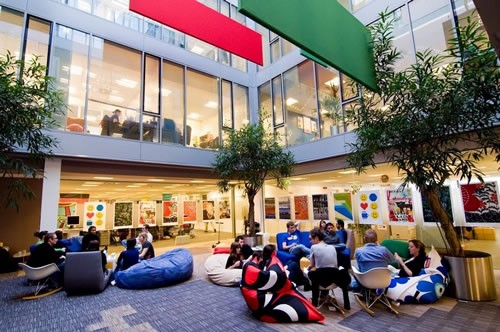There’s a quiet revolution happening across forward-thinking workplaces throughout the developed world. We knew it was coming. There were hints of the changing of the guard peppered throughout the late 90s and early 2000s. It was a generational shift in workplace attitudes, an idea that work needn’t be a backbreaking, soul-crushing endeavour; that work could actually be a fun place, a place that championed community and family. Workplace culture became a thing. It was a means to keep employees happy, engaged, and connected to the company as a whole.
Indeed, this was Generation X taking the reins from the Baby Boomers. Well intentioned as they were, they sort of missed the mark when it came time to truly understand the motivation of employees. They focused on the company, and not the individual needs of those who worked there. One needn’t look much further than the movie, Office Space, to see the culmination of this line of thought. Work was still work and employees could see right through the cynical intentions of their managers.

Generation Xers were close, but still not quite there. Employee happiness and motivation was still tied very much to their lives outside of work. For many, work was merely a necessary evil that facilitated play time at home. We were all working for the weekend, so to speak. And then came the Internet. And then came Google. Word about this highly successful tech company that was shaping the future spread quickly. But there was something different about how they were creating their workspace. For the first time in pop culture, employee happiness and engagement was linked to their productivity. One needn’t be a workhorse for 12 hours a day to be the most productive. One could be highly productive and produce more in 2/3rds the time, if only they were happy. Google’s headquarters, known as the Googleplex, is a testament to this new line of thought. Brightly coloured environments more akin to a daycare than a leading technology and software company filled the California complex. The buildings all situated amongst a pristine green landscape. Google was changing the world.
Enter the Millennials. A generation more concerned with meaningful experiences than material things. They heard about Google and this new kind of office space. The Internet had showed them every possibility. They weren’t going to be satisfied working in some grey-cubicle’d office, no matter the amount of cake, they needed something more. They needed play.
Now, a lot has been said of the younger generation, and some reading this might already be thinking, “Who cares what Millennials need?” That entitled generation is going to be the end of humankind. This kind of thinking is as old as our history books. Aristotle once said of youth, “They think they know everything, and are always quite sure about it.” And that was in the 4th century BCE. Truth is, every older generation thinks less of those coming up behind them. How we treat Millennials is indicative of how Baby Boomers treated the slacker Generation X. If Millennials are entitled, that’s only because the generation before them raised them that way.
The fact remains, by 2025 Millennials are going to make up nearly 75% of the workforce. Nearly 80% of Millennials believe it’s important to have fun at work. That means 60% of the entire workforce, a majority, will want careers that can facilitate their changing priorities. Companies looking to attract the most talented of this generation need to take heed that the tides are changing. If they don’t, they risk missing out on hiring the best of the next generation of leaders and innovators. If you work in any sort of creative industry, incorporating play is not so much a bonus as it is a necessity. Because if you’re not doing that, your competition is. A mind is a terrible thing to waste, and boredom at work can lead even the most talented of employees to leave one workplace for another. Add to that that the difference in productivity between a happy worker, and one that is unsatisfied sits around 22%. It has never been clearer that a happy employee saves money. Simply put, investing in play makes cents.

So what’s a company to do? It’s surprisingly easy to make time for employee play, and to promote a positive and happy work environment. It can be the little things, a lunch-room puzzle that generates a peaceful escape and facilitates community.
It can be starting the week by gathering and sharing the things that interest individuals, that aren’t necessarily tied to work, but are tied to unique interests – showcasing personalities and unusual topics.
It can be fostering friendly competition focused on strengthening teams, or simply having a good time.

And it can designating a half-hour at the end of each week to gathering as a team with no other purpose than to socialize, catch-up, crack jokes, and wind down.
adHOME does all of these things. Not because we have to, but because we want to, and we enjoy it. It’s generating play for Generation Play.